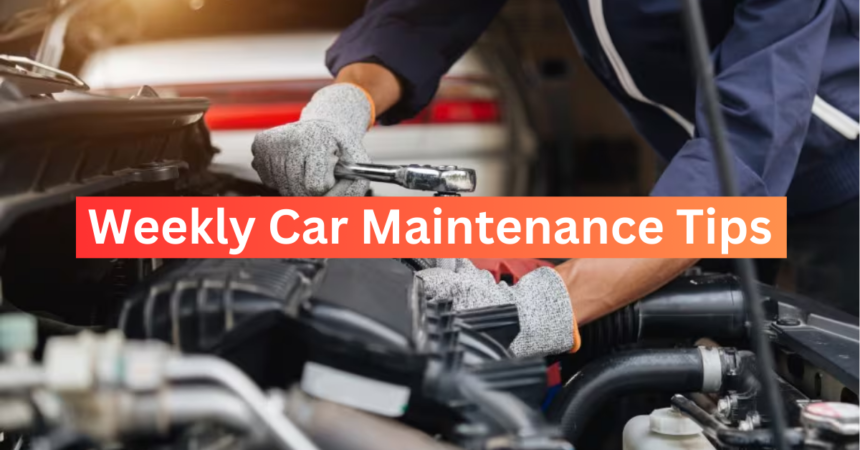Regular car maintenance is crucial for ensuring a smooth, safe, and efficient driving experience. By dedicating just a few minutes each week to these simple tasks, you can extend your vehicle’s lifespan, improve its performance, and potentially save money on costly repairs. Let’s explore the top 10 weekly car maintenance tips that every driver should follow.
What is Car Maintenance and Why is it Important?

Car maintenance refers to the regular checks and services performed on a vehicle to keep it in optimal working condition. It involves inspecting, repairing, and replacing various components of a car to ensure its longevity, safety, and performance.
Regular car maintenance is crucial for several reasons:
- Safety: Well-maintained vehicles are less likely to break down or malfunction, reducing the risk of accidents.
- Cost-effectiveness: Routine maintenance can prevent minor issues from escalating into major, expensive repairs.
- Performance: A well-maintained car runs more efficiently, providing better fuel economy and smoother operation.
- Longevity: Proper care extends the lifespan of your vehicle, protecting your investment.
- Environmental impact: Regular maintenance helps reduce harmful emissions, contributing to a cleaner environment.
Now, let’s explore the top 10 weekly car maintenance tips that every driver should follow for smooth driving.
Top 10 Weekly Car Maintenance Tips
1. Check Tyre Pressure and Condition
Proper tyre maintenance is essential for your safety and your car’s performance.
Each week:
- Check tyre pressure using a reliable gauge
- Inspect tyres for signs of wear, cuts, or bulges
- Rotate tyres as recommended by your vehicle’s manual
Maintaining correct tyre pressure improves fuel efficiency and ensures even wear, prolonging the life of your tyres.
2. Monitor Fluid Levels
Regularly checking and topping up essential fluids keeps your car running smoothly.
Weekly, inspect:
- Engine oil
- Coolant
- Brake fluid
- Power steering fluid
- Windshield washer fluid
Low fluid levels can lead to serious mechanical issues if left unaddressed.
3. Test Lights and Signals
Ensure all your vehicle’s lights and signals are functioning correctly:
- Headlights (low and high beams)
- Taillights
- Brake lights
- Turn signals
- Hazard lights
Properly working lights are crucial for your safety and the safety of other road users.
4. Inspect Windshield Wipers
Clear visibility is paramount for safe driving. Weekly:
- Check wiper blades for wear or damage
- Test wipers with washer fluid
- Replace blades if they’re streaking or skipping
Good quality wipers are especially important during rainy or snowy weather.
Also Read: TVS Motor Launches 2024 Apache RTR 160 Race Edition
5. Listen for Unusual Noises
Pay attention to any strange sounds your car makes during operation:
- Squealing brakes
- Rattling exhaust
- Knocking engine sounds
Unusual noises often indicate developing problems that should be addressed promptly.
6. Check the Battery
A healthy battery is crucial for reliable starting and operation. Weekly:
- Inspect battery terminals for corrosion
- Ensure connections are tight
- Check battery fluid levels (if applicable)
Regular battery maintenance can prevent unexpected breakdowns and extend battery life.
7. Examine Belts and Hoses
Belts and hoses are critical components that can cause significant issues if they fail. Inspect them for:
- Cracks or fraying in belts
- Bulges or leaks in hoses
- Proper tension in belts
Catching wear early can prevent breakdowns and expensive repairs.
8. Clean Your Car
Regular cleaning isn’t just about aesthetics; it’s also about maintenance:
- Wash the exterior to remove dirt and potential corrosive substances
- Vacuum the interior to prevent debris from damaging components
- Clean windows and mirrors for better visibility
A clean car is easier to inspect and can help you spot developing issues.
9. Check Engine Oil
While a full oil change isn’t necessary weekly, it’s important to:
- Check oil levels using the dipstick
- Look for any discoloration or debris in the oil
- Top up if necessary, using the correct grade of oil
Proper oil levels and quality are essential for engine health and longevity.
10. Inspect Brakes
Your braking system is crucial for safety. Weekly, pay attention to:
- Any changes in the brake pedal feel
- Unusual noises when braking
- Vibrations when applying brakes
If you notice any issues, have your brakes inspected by a professional immediately.
Also Read: Upcoming Cars and SUVs Arriving This Festive Season in India
Conclusion: Weekly Car Maintenance Tips
By following these top 10 weekly car maintenance tips, you’ll ensure smoother driving, and improved safety, and potentially save money on costly repairs in the long run. Remember, while these checks are important, they don’t replace the need for regular professional servicing as recommended by your vehicle’s manufacturer.
Frequently Asked Questions
Q: How often should I check my tyre pressure?
A: Check your tyre pressure weekly or before long trips.
Q: Can I use any type of oil for my car?
A: No, use the grade of oil recommended in your vehicle’s manual.
Q: How often should I rotate my tyres?
A: Typically every 5,000 to 8,000 miles, but consult your car’s manual.
Q: What should I do if I hear unusual noises from my car?
A: Have it inspected by a professional mechanic as soon as possible.
Q: How often should I change my windshield wipers?
A: Replace them every 6-12 months or when you notice reduced performance.
Q: Is it necessary to warm up my car before driving?
A: Modern cars don’t require long warm-ups; 30 seconds is usually sufficient.
Q: How can I improve my car’s fuel efficiency?
A: Maintain proper tyre pressure, remove excess weight, and avoid aggressive driving.






